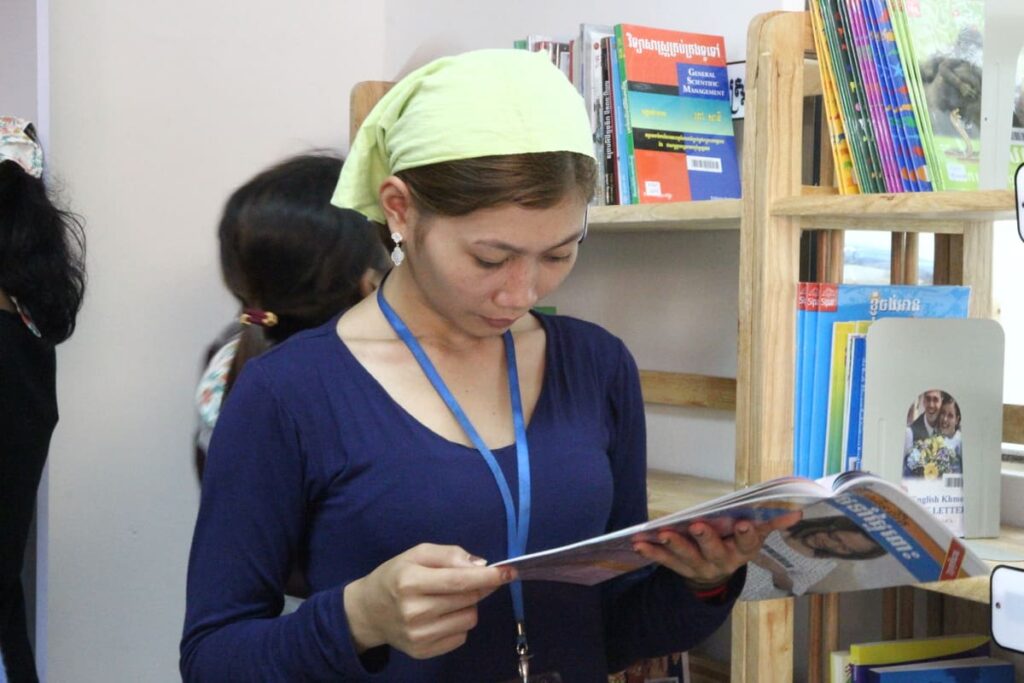the newspaper la croix to discover libraries in textile factories
On June 6, 2023, the newspaper La Croix published an article on the factory libraries installed by Sipar and the importance of reading for workers. Our project development officer, Béatrice Montariol, accompanied their reporter.

Phnom Penh (Cambodia)
From our special envoy
In the huge production workshops of the Top Summit company¬, 5,800 little hands repeat, in a crackle and an infernal pace, the same tasks behind sewing or weaving machines. At lunchtime, many of them flee this harrowing noise to take refuge in an amazing little haven.
Enthroned on the floor of the refectory of this textile factory on the outskirts of Phnom Penh, a library resembling a high school permanent contract offers exactly 4,621 books to its employees, the vast majority of whom are employees. There, a dozen of them, sitting around a table, read with attention and delight novels, tales, or essays.
Peu Sreion is among the faithful. "We are less bored at the break and we acquire knowledge,"says the 26-year-old, a sailor in the company's colours, an attempt at general culture in her hands. The daughter of farmers from the mountainous province of Kampong Speu, Peu Sreion had to leave school at 12 to help her family on the farm. Thanks to the library, she makes up for her missed years of schooling and borrows books she can't afford.
"Even books on agriculture that I bring to my parents when I come back to the village!", she says. And when she returns to the dormitory of the workers' city with a bag full of books, the employees of other factories ask her "where does it come from?". "From the factory!", she answers. "But no one believes me"she says, shrugging her shoulders.
Top Summit is one of thirty textile factories in Cambodia that have benefited from the program conceived by the French NGO Sipar to create libraries to offer reading services, book loans and literacy classes. The textile sector, the economic lifeblood of the developing country of 16 million people, employs 800,000 people, 85 per cent of whom are women. And 14% of the working population is illiterate, according to UNESCO..
Ten years later, 25 of the 30 libraries created are still operating. "It's reassuring to see that the majority of these companies, whose primary goal remains profitability, have decided to continue this educational adventure,"says Béatrice Montariol, advisor in charge of project development at Sipar. Originally, the NGO crisscrossed workers' housing estates aboard mobile libraries.
"Borrowed books weren't coming back, it was a pretty good sign," she recalls. "This convinced the factories that a worker happy to go to work to learn to read, or to discover reading, would be encouraged to stay in the company. And in fact, companies have seen a decrease in absenteeism and turnover after a few months. »
Hong Vannak, librarian at Top Summit, agrees: "Women readers have a better relationship with work. The factory becomes a place of socialization, some get to know each other and even see each other outside." The library opened in the factory in 2015, after protests in 2013-2014 demanding better wages. At the time Hong Vannak was a printer. By dint of seeing her devour books, the management offered her to become responsible for the place. "An unimaginable promotion!" says the 32-year-old former worker.
The factory of the British company Dewhirst was the first to embark on the library adventure in 2013. "I borrow four books a week, illustrated stories, easy to read, tales for my daughter who is 4 years old," says Thaung Sreipeu, sketching a faint smile, all in contained joy, due to the reopening of the library a few months ago. "I had to stop for a long time,"sighs the 30-year-old seamstress, wearing an orange T-shirt in the name of the employer, who has lived hard with the deprivation of books during the pandemic.
"I used to read romance novels," she confesses, a little embarrassed. Now a mother, Thaung Sreipeu prefers to read for her daughter. "I want to put all the chances on her side: giving her the habit of listening to stories will help her when she learns to read,"she hopes, anxious to offer her the education she did not have. At her side, Hon Sreinet, pregnant at 23, even takes the lead for the future education of her child, she who was placed in an orphanage at 8 years old.
"At home, I read aloud for my baby, he loves it because he beats me, but here, I can't, otherwise I disturb others,"she laughs, surrounded by her colleagues who burst out laughing. "I like real stories that have a moral,"she says. "I read to dream and forget the harshness of life,"says ¬Sambath Chlay, his face prematurely worn. At 59, the dean of the library gets up every day at 4 a.m., travels two hours to the factory where, as a housekeeper, she washes the floor between production lines.
Despite the doubling of the minimum wage (€190 per month) in a decade, factory life remains difficult, eight hours a day, six days a week. "Reading allows me to breathe," smiles volunteer librarian Voun Sima, raising a head before diving back into reading Little Prince. The young employee, just in her twenties, dreams of a better future and helping the most precarious, thanks to the evening classes she still attends after her day at the factory.

Félicitations pour ce très beau résultat C’est formidable d’ouverture pour ces jeunes ouvrières avides de connaissances !
Merci pour votre commentaire 🙂